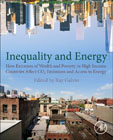
Inequality and Energy: How Extremes of Wealth and Poverty in High Income Countries Affect CO2 Emissions and Access to Energy
Galvin, Ray
Extreme economic inequality has increased within developed countries over the past three decades. The effects of inequality are now seen increasingly in health, housing affordability, crime and social cohesion. There are signs it may even threaten democracy. Researchers are also exploring its effects on energy consumption. One of their key findings is that less privileged groups have lost consistent access to basic energy services like warm homes and affordable transport, leading to huge disparities of climate damaging emissions between rich and poor. This book challenges researchers on energy consumption in developed countries to reorient their research frameworks to include the effects of economic inequality within the scope of their investigations, and calls for a new set of paradigms for energy consumption research. It explores concrete examples of energy deprivation due to inequality, and provides conceptual tools to explore this in relation to other issues regarding energy consumption. It thereby urges that energy consumption approaches be brought up to date for a world of increasing inequality Provides overwhelming evidence of the persistent and increasing income inequality and wealth inequality in developed countries over the past three decadesShowcases recent empirical work that explores correlates of this inequality with energy consumption behaviour and some of the key problems of access to adequate energy servicesShows the connections between these findings and the existing ways of researching energy consumption behaviour and policy INDICE: 1. Introduction2. Fuel poverty, economic inequality and the politics of avoidance3. Gender, economic inequality and energy consumption4. Household energy consumption and economic inequality5. Shifts in housing affordability and implications for young adults6. Housing tenure and thermal quality of homes - how home ownership affects access to energy services7. Income inequality and fuel poverty in EU countries - a macroeconomic perspective8. Growing inequality of wealth and energy use in light of the energy transition: economic considerations and policy implications9. The sociology of money: a guide for energy consumption research10. Practice theory and a sociology of money11. Can economic inequality be reduced? Challenges and signs of hope
- ISBN: 978-0-12-817674-0
- Editorial: Academic Press
- Encuadernacion: Rústica
- Páginas: 304
- Fecha Publicación: 01/01/2020
- Nº Volúmenes: 1
- Idioma: Inglés
